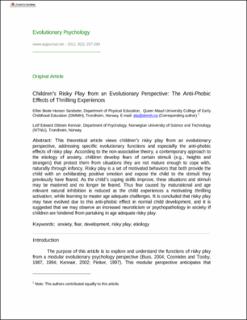| dc.contributor.author | Sandseter, Ellen Beate Hansen | |
| dc.contributor.author | Kennair, Leif Edward Ottesen | |
| dc.date.accessioned | 2020-10-02T11:49:10Z | |
| dc.date.available | 2020-10-02T11:49:10Z | |
| dc.date.created | 2011-06-21T10:47:09Z | |
| dc.date.issued | 2011 | |
| dc.identifier.citation | Sandseter, E.B.H., Kennair, L. E.O. (2011). Children’s Risky Play from an Evolutionary Perspective: The Anti-Phobic Effects of Thrilling Experiences .Evolutionary Psychology, 9 (2), 257-284. | |
| dc.identifier.issn | 1474-7049 | |
| dc.identifier.uri | https://hdl.handle.net/11250/2680940 | |
| dc.description.abstract | This theoretical article views children’s risky play from an evolutionary perspective, addressing specific evolutionary functions and especially the anti-phobic effects of risky play. According to the non-associative theory, a contemporary approach to the etiology of anxiety, children develop fears of certain stimuli (e.g., heights and strangers) that protect them from situations they are not mature enough to cope with, naturally through infancy. Risky play is a set of motivated behaviors that both provide the child with an exhilarating positive emotion and expose the child to the stimuli they previously have feared. As the child’s coping skills improve, these situations and stimuli may be mastered and no longer be feared. Thus fear caused by maturational and age relevant natural inhibition is reduced as the child experiences a motivating thrilling activation, while learning to master age adequate challenges. It is concluded that risky play may have evolved due to this anti-phobic effect in normal child development, and it is suggested that we may observe an increased neuroticism or psychopathology in society if children are hindered from partaking in age adequate risky play. | |
| dc.description.abstract | Children’s Risky Play from an Evolutionary Perspective: The Anti-Phobic Effects of Thrilling Experiences | |
| dc.language.iso | eng | |
| dc.title | Children’s Risky Play from an Evolutionary Perspective: The Anti-Phobic Effects of Thrilling Experiences | |
| dc.type | Peer reviewed | |
| dc.type | Journal article | |
| dc.description.version | publishedVersion | |
| dc.source.pagenumber | 257-284. | |
| dc.source.volume | 9 | |
| dc.source.journal | Evolutionary Psychology | |
| dc.source.issue | 2 | |
| dc.identifier.cristin | 826402 | |
| cristin.unitcode | 253,0,0,0 | |
| cristin.unitname | Dronning Mauds Minne Høgskole for barnehagelærerutdanning | |
| cristin.ispublished | true | |
| cristin.fulltext | original | |
| cristin.qualitycode | 1 | |
